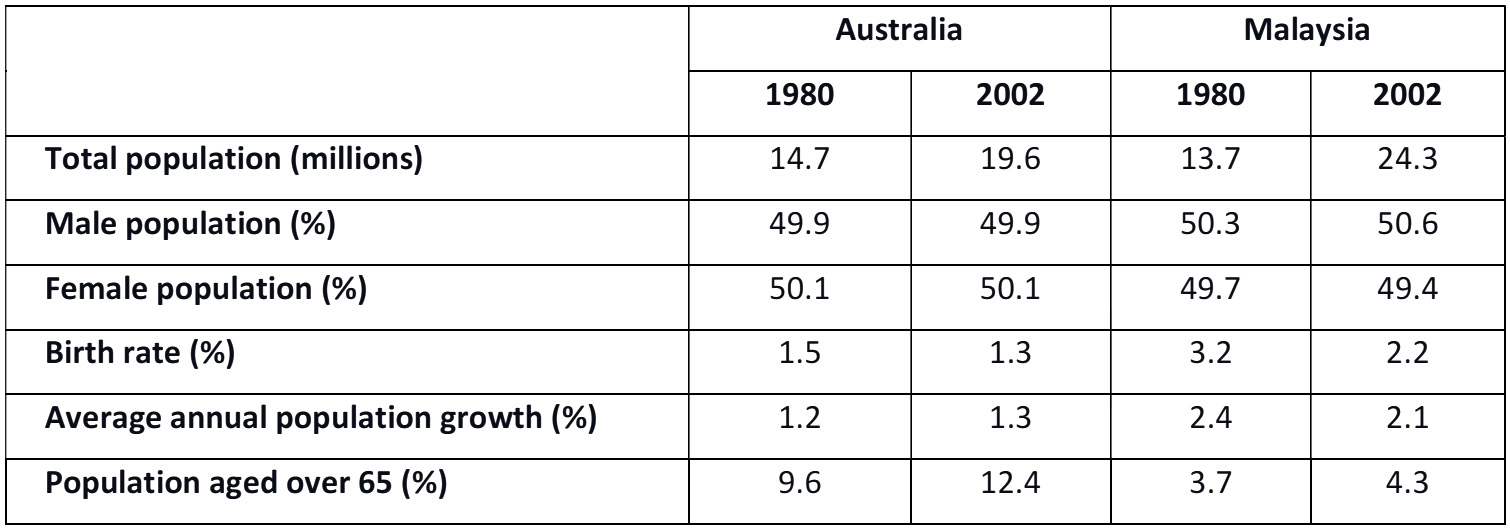IELTS Writing Recent Actual Test 64
WRITING TASK 1
You should spend about 20 minutes on this task
The table below gives information about population in Australia and Malaysia in 1980 and 2002.
Write at least 150 words.

WRITING TASK 2
You should spend about 40 minutes on this task
Write about the following topic:
Parents often give children everything they ask for and do what they like. Is it good for children? What are the consequences when they grow up?
Give reasons for your answer and include any relevant examples from your own knowledge or experience.
Write at least 250 words.
SAMPLE ANSWER IELTS WRITING TEST 64
WRITING TASK 1The given table compares a range of demographic data from Australia and Malaysia in 1980 and 2002.
In general, Malaysia had a relatively younger population than Australia, and a remarkably faster population growth.
Looking at the table in more detail, it can be seen that the gender ratios in both countries were almost perfectly balanced. There were slightly more women in Australia and slightly more men in Malaysia in both years. Also, the difference in population between the two countries in 1980 was minimal, at only about 1 million. However, the difference was around 5 million in 2002, as the population of Malaysia almost doubled.
The two countries also differed widely in relation to the birth rate. The birth rate in Malaysia was almost twice as high as that of Australia (3.2% and 2.2% compared to 1.5% and 1.3%). As a result, average annual population growth in Malaysia was also higher. Another notable feature is that while the percentages of people aged over 65 in Malaysia were approximately 4% in both years, the figures for Australia were much higher, at 9.6% and 12.4% in 1980 and 2002, respectively.
(188 words)
WRITING TASK 2Parental approaches to raising children surely play a key role in a child’s development. Many parents often over-indulge their children, and I feel that this method would significantly hinder their individual growth and later adult life.
It is human nature to love their offspring, however over-indulgence is a poor choice of rearing. Children need to learn through reward and punishment, which means that they should be punished for what they do wrong and rewarded when they achieve something. Punishments like withdrawal of privileges or even those of physical nature could sometimes be needed to educate children. However, if they are allowed to do whatever they want, they will not understand the difference between right and wrong and become ignorant, thoughtless individuals.
Providing youngsters with whatever they desire would teach them nothing but to have no regard for what they already have. For example, they will pester their parents to buy them a new toy if they are bored with the one they have. This is extremely dangerous because it could be the basis of their character when they grow up.
When there is no limit to the indulgence parents show towards their kids, these children will become needy and dependent, and therefore are unable to live on their own. In some cultures like Vietnam, parents pick up their kids from school even during high school, buy their clothes and cook for them at home. Children do not have to do anything, which is mainly why many of them cannot stay away from their parents and live independently even when they are in their twenties.
In conclusion, I firmly believe that indulgence should be limited. Otherwise, it may poorly shape children’s personalities and restrict their ability to lead an independent life later on.
(292 words)
